- Home
- Will Hobbs
Kokopelli's Flute
Kokopelli's Flute Read online
WILL HOBBS
KOKOPELLI’S FLUTE
ALADDIN PAPERBACKS
New York London Toronto Sydney
If you purchased this book without a cover, you should be aware that this book is stolen property. It was reported as “unsold and destroyed” to the publisher, and neither the author nor the publisher has received any payment for this “stripped book.”
This book is a work of fiction. Any references to historical events, real people, or real locales
are used fictitiously. Other names, characters, places, and incidents are the product
of the author’s imagination, and any resemblance to actual events or locales
or persons, living or dead, is entirely coincidental.
ALADDIN PAPERBACKS
An imprint of Simon & Schuster Children’s Publishing Division
1230 Avenue of the Americas, New York, NY 10020
www.SimonandSchuster.com
Copyright© 1995 by Will Hobbs
All rights reserved, including the right of reproduction in whole or in part in any form.
ALADDIN PAPERBACKS and colophon are trademarks
of Simon & Schuster, Inc.
Also available in an Atheneum Books for Young Readers hardcover edition.
Designed by Michael Nelson
The text of this book was set in Century Schoolbook.
Manufactured in the United States of America
First Aladdin Paperbacks edition July 2005
6 8 10 9 7 5
The Library of Congress has cataloged the hardcover edition as follows:
Hobbs, Will.
Kokopelli’s flute/Will Hobbs.—1st ed.
p. cm.
Summary: Thirteen-year-old Tepary discovers an old flute in a cliff dwelling in New Mexico,
and through its power he learns about ancient Native American magic.
ISBN 0-689-31974-6 (hc.)
[1. Flute—Fiction. 2. Magic—Fiction. 3. Indians of North America—New Mexico-Fiction.
4. New Mexico—Antiquities—Fiction.] I. Title.
PZ7.H6524Ko 1995
[Fic]—dc 20
95-8422
ISBN-13: 978-1-4169-0250-8 (pbk.)
ISBN-10: 1-4169-0250-3 (pbk.)
eISBN: 978-1-439-13674-4
KOKOPELLI’S FLUTE
Books by WILL HOBBS
Changes in Latitudes
Bearstone
Downriver
The Big Wander
Beardance
Beardream
Kokopelli’s Flute
For my sister Barbara
with special thanks to Dusty for Dusty
KOKOPELLI’S FLUTE
1
The magic had always been there. In the light, in the rock, in the miniature city the Ancient Ones left perched in the cliffs. I’ve always felt it. It seems like every day of my life I’ve been trying to get a little closer to the magic. This would be the night I not only got close, but crossed over.
The long June day was ending as I was hiking to the ruin with my dog, Dusty. This was going to be my first total eclipse of the moon, and I wanted to witness it from Picture House. For all the time I’d spent there, puzzling over the secrets of the ancient pueblo, I’d never had an opportunity like a total eclipse. Maybe during the eclipse, if I listened hard enough, I might hear the footsteps of the Ancient Ones. I might even hear their voices. It might be a matter of being in the right place at the right time. Who knows, I might even see dancers appearing on the dance plaza from their underground kivas.
After the eclipse, I’d have my night-hike back home. Night is my favorite time, and every so often I hike by the moon. Like Ringo, my pet ringtail, I was born nocturnal. All the sleep I’ve ever needed is a few winks here and there. Tepary Jones is my name, after the fabulous tepary bean, of course.
Dusty and I stopped at the spring where the people from Picture House had come for centuries to get their water. Despite how dry it had been this year, water was still gushing from a thin layer of shale and falling into the pool below. The cliffs and the mesa tops were glowing with the last reflections of the sunset as we watched the full moon rise over the canyon rims of our out-of-the-way corner of northern New Mexico.
I shucked my clothes and dove into the pool. A cool jolt ran through me like electricity. “Jump in, girl!” I called to Dusty, and she did. I’m thirteen, and Dusty just turned eleven. At her age, even a natural swimmer like a golden retriever takes a little bit of encouragement, but there’s a lot of puppy left in that old dog’s heart.
I climbed out and shivered, and Dusty shook, and I rested my back against a slab jutting twenty feet into the air. A minute later I was dry and comfortable. The slab is an ancient creek bed turned to stone. You can still see the wavy water lines that the receding creek left behind, and even the tracks of a turkey-sized dinosaur that walked across the mud and left its mark in time.
Still a couple of hours until the eclipse. I dressed, and we threaded our way through the scrubby pinyon pines and junipers we call a forest around here, until we could see Picture House with its five kivas, forty-three rooms, and two towers gleaming across the ancient dance plaza. The cave that housed the cliff dwelling soared high and wide, dished out of the arching cliff. Eight hundred years ago the people came through all those little doorways for the last time, walked away, and left only stillness, silence, and secrets.
This is where I wanted to watch, to try to feel what the people must have felt when they witnessed an eclipse of the moon from Picture House. I curled up a stone’s throw from the ruin and started snacking on a bag of pinyon nuts. Sitting on her haunches, Dusty’s face was on a level with mine. Her muzzle was grizzled these days, like she’d stuck it in a bag of flour. I pointed at the moon, so close it seemed you could reach out and grab it.
“Tep-a-ree Jones and his faithful dog Dusty waiting for the eclipse of the moon,” I half-sang. “Picture House, New Mexico. Tep the Bean Man, the Human Bean, Dusty the dog, the old retriever, Old Faithful, waiting for the eclipse with her sidekick Tepary Jones.”
I listened to the silence coming out of the ruin, silence so deep it seemed loud, and I waited for something to break it. I wondered if I’d hear from the great horned owl nesting high in the cliff above the ruin. I wondered if the ancestors of that owl nested in the same spot back when people had lived here.
The silence was broken at last by the scurrying feet of packrats coming to life now that day was done. Not all the residents of Picture House had abandoned their homes.
I fell asleep. I don’t sleep much, but when I do, I sleep ferociously and my dreams often take strange shapes. Sometimes I wonder if they are dreams of the future. I could have used a glimpse of the future now, a dream to warn me away from Picture House.
Next thing I remember, Dusty was stirring. I checked on the moon and found it full as before, barely higher in the sky. I hadn’t missed the eclipse. Suddenly I became aware of what Dusty already knew—voices were coming from the ruin. I was surprised and more than a little alarmed. We never ran into people up at Picture House.
I put my fingers to my lips. Dusty understood; we were old tracking partners. Once we even beat a mountain lion at her own game of watching without being seen.
Angling for a good vantage point, I crept a little closer, crouching behind the bushy junipers outside the big cave’s drip line. Two voices. They were coming from inside the ruin all right, which rose like steps from one to two to three stories, all the rooms still perfectly preserved with even a couple of ladders connecting roofs and balconies. Picture House was lit up bright silver by the moon but still I couldn’t see anyone in there. Then I heard a man’s voice say, “This is going to be a five-thous
and-dollar night.” The second man laughed and said, “Ten-thousand-dollar night. This place has never been dug before.”
I caught myself, hoping I’d heard wrong, but I’d heard what I’d heard. Pothunters! It felt like the wind had been knocked out of me, and I went down on my knees. I couldn’t believe this was really happening. Picture House had never been vandalized before; it’s the “last, best jewel,” as my mother likes to put it, of all the cliff dwellings in the Four Corners states. The ruin isn’t marked on maps, and it’s sure enough hard to get to. But my folks had always said it was bound to get “bombed” one day.
I could hear the pothunters’ shovels. I could see the bright light of their lanterns cast a hundred feet up on the arching cliff wall above the ruin. But we couldn’t see the looters from where we were.
Sound doesn’t carry into the wide cave anything like it carries out, so we had an advantage there. I crept closer, Dusty understanding the need to use the cover. My heart was pounding like thunder.
The voices were muffled now. I couldn’t tell why. I held my breath and inched closer until I saw the shadow of one of the men, magnified by his glass lantern to forty feet or more against the cliff where hundreds of petroglyphs were chipped into the smooth red sandstone. It was this wall of pictures that had given the lost city its name. I’d stood right where that pothunter was standing more times than I can remember, trying to decipher the jumble of symbols on that wall: the crooked lines that could have been snakes or lightning or rivers, the upside-down human figures, the bear tracks, the bird-headed people, the bighorn sheep, the hand-prints, the gallery of spirits with all manner of strange headgear, the humpbacked flute player bringing up the corn with the power of his magic song.
The Hopi Indians over in Arizona still remember their name for the flute player, the far-walking magic person who brought the seeds from village to village, whose journeys are remembered on rock walls from Peru to Colorado. Kokopelli is his name. He must have been something, my father likes to say, to be the only person remembered by name from those ancient times. He must have been able to make corn sprout and grow before your very eyes.
I listened carefully. For a while all I heard was digging, the brutal ring of metal against stone. Sometimes pothunters even wrecked the pictures. If they wrecked Kokopelli, I—I didn’t know what I would do. I didn’t know if I should be running for help now or staying to watch a little longer, to see if I could get a good enough look at the men to identify them later.
The Picture House wall had two big Kokopelli petroglyphs, maybe eight feet apart, and they were facing each other. I always wondered why the people who made the petroglyphs usually gave Kokopelli antennas if he was supposed to be a human being. Between the Kokopellis were two spirals side by side, so close together they were almost touching. Surrounding the spirals there were corn plants, lots of corn plants. The two humpbacked flute players were bringing up the corn with their magic flutes.
Now I could see the man who was casting the shadow on the cliff. He was stocky, I could see that, but I couldn’t make out his features under his hard-hat. The bandanna over his nose and mouth partly concealed a dark beard.
There was a gun at his hip.
2
The bearded man was pulling sticks and other packrat rubbish out of the narrow space between the cliff and the back wall of the room at the edge of the ruin. I realized that the bandanna was probably on account of hantavirus. Everyone anywhere close to the spot where New Mexico, Colorado, Utah, and Arizona come together at the Four Corners holds their breath around rodent droppings—the droppings of deer mice especially. My dad and I are pretty worried about my mother, but she’s wearing a mask now when she’s working in her lab. Hantavirus has killed eleven people within a hundred miles of here in the last six months, and before that nobody had even heard of it. For a couple of weeks after you catch it, they say, you don’t even know you’ve got it. Once it breaks out, all it takes is forty-eight hours. Your lungs fill up with fluid, you can’t breathe, and then you die.
These pothunters were so greedy even hantavirus couldn’t scare them off. Sitting out in the open was a graceful pot they’d already dug up, probably a seed jar. It didn’t look big enough to be a water jar. With its elaborate black-on-white designs, it would bring a lot of money on the black market.
Dusty whined ever so slightly when she saw the pot, and I gave her a look. The sight of a freshly dug pot was too much for her, I guess. Even so, I was surprised. She could’ve given us away if the pothunter hadn’t been making so much noise dragging out the packrat rubbish.
I suppose all those memories of her glory days must’ve come rushing back and overwhelmed her with nostalgia.
Dusty wasn’t ever trained to sniff out underground water jars, kiva jars, seed jars, and mugs and so on. She developed that knack herself back when my parents were working as archeologists. Try to get her to fetch sticks like an ordinary retriever—she had no interest.
The moonlight on Picture House seemed dimmer than before. With a glance over my shoulder, I found the moon already a quarter darkened. I’d missed the beginning of the eclipse!
Dusty whined again. This time the pothunter with the bandanna over his nose and mouth paused and listened, and his hand went to the revolver on his hip. There was only the sound of his partner digging inside the room where the light of a second lantern was pouring out the keyhole-shaped doorway.
The man on the outside pulled his bandanna below his mouth. “Did you say something, Rodney?” he called, and was answered by a grunt from within.
I could picture the inside of that room, I’d been in there so many times. The smooth plaster on the back wall remained perfectly intact. It was decorated with a row of white triangles at eye level, like snowclad mountain peaks upside down. At one end of the row was a crescent moon; at the other, the moon was full.
I could guess why the pothunters were trying to get at the dead space between the cliff and the back wall of that room. The ancient people almost never built a back wall if the room backed up to the cliff—the cliff wall would do fine. They would only have built a back wall a little ways out from the cliff if they wanted to use the space in between for a purpose, like burying someone in there.
And with a burial the Ancient Ones almost always left pots.
The man inside the room must be opening up holes in that back wall, which rose about twenty feet before it met the curving cliff. He’d probably been robbing graves for years and knew exactly what he was looking for. I was hoping he was finding nothing for his trouble but packrat nests. I wondered if he knew that to paleontologists like my mother—scientists who study plants and animals that lived in the past—packrat nests are natural time capsules and scientific treasures.
Probably he hadn’t heard that.
For five years now, my mother had been studying samples from a midden, a huge hanging rat-dung heap in a niche at the other end of the big cave. She thinks that the packrat middens might explain some of the mysteries of Picture House.
There aren’t many paleontologists who do what my mother does. Lately they’ve come up with a name for her specialty: “paleonidology,” the study of old nests.
I was trying to think if there was anything I could do to scare off the pothunters when I heard a big rumble, then glass breaking as the light inside the room was suddenly extinguished. Dust billowed out of the keyhole doorway and kept coming. The man had brought the wall down on himself!
All of a sudden the man on the outside was hollering and dancing straight up and down as three or four packrats ran out of the doorway and between his legs. They were bushy-tailed woodrats, big ones. Dusty had her head cocked, studying those rats running for cover, and I laughed under my breath at the sight of that dancing dirtbag.
The dust was clearing some. The man from inside emerged limping, all covered with dust, and tore off his bandanna. He had a drooping mustache. Both of them were in their late twenties. The man who was hurt was coughing and swearing, limping
around and trying his knee. “I got bit by a rat!” he was yelling. “Probably gonna get rabies! Probably gonna get hantavirus!”
“Rodney, you’re lucky, considering…. I keep telling you to wear a hardhat.”
The tall one slapped his crushed cowboy hat against his leg, making bursts of dust. “Tell me about it, Duke, you tell me all about it…. well, something fell out from behind the wall, right onto me. It felt disgusting. Go check it out.”
The bearded man took the lantern inside and emerged a few minutes later with a small basket. He was almost giddy. “What fell in your face was a burial, Rodney. Awful well preserved, I’ll tell you, but he kind of busted up when he fell. An albino, from the looks of him—pink skin. Looks weird enough, I’ll tell you. There was a big pot that got broke, and this basket was inside it.”
They started pulling objects out of the basket and setting them out on the bedrock at the foot of the picture wall. “Look at all this stuff!” Mustache shouted. “Crystals, arrowheads, shell beads, a stone pipe, some roots or something, porcupine teeth, a bone flute … and look at all these little pouches!”
“Medicine man’s bundle!” his partner declared. “No doubt about it: our albino was a medicine man. We’ll open the pouches later. Even our dad never found a medicine man’s bundle!”
“Ten-thousand-dollar night, I told you, Duke! Maybe more!”
Just then the great horned owl up in the cliff hooted with that deep voice of hers, hoo, hoo-hoo-hoo, hoo-oo, hoo-oo.
“Spooky,” one of them said.
Just after he spoke, their surviving lantern dimmed and then went out. “Really spooky,” the other agreed.
The eclipse had devoured three quarters of the moon, and there was little light reaching the ruin. After the brothers had fumbled around for about five minutes, the same one who’d been hurt before started screaming that he’d just been stung by something. “Probably a scorpion!” he bellowed.

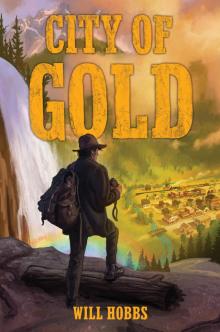 City of Gold
City of Gold Kokopelli's Flute
Kokopelli's Flute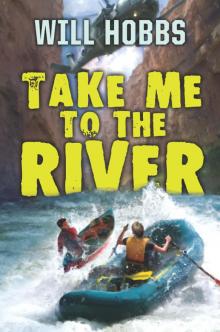 Take Me to the River
Take Me to the River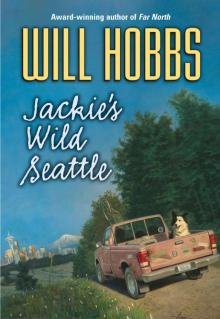 Jackie's Wild Seattle
Jackie's Wild Seattle The Maze
The Maze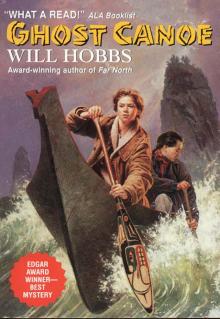 Ghost Canoe
Ghost Canoe Never Say Die
Never Say Die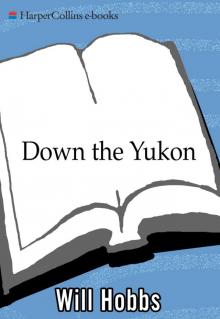 Down the Yukon
Down the Yukon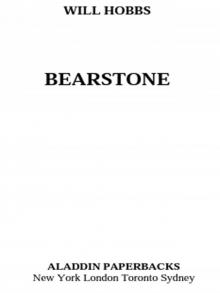 Bearstone
Bearstone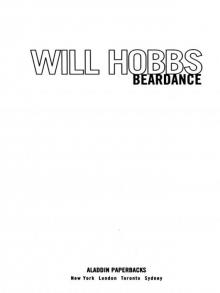 Beardance
Beardance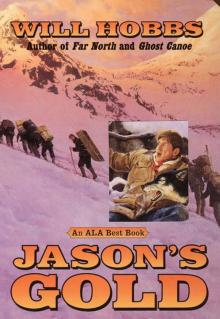 Jason's Gold
Jason's Gold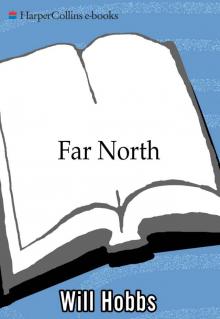 Far North
Far North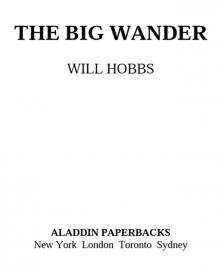 The Big Wander
The Big Wander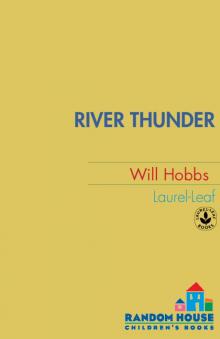 River Thunder
River Thunder Downriver
Downriver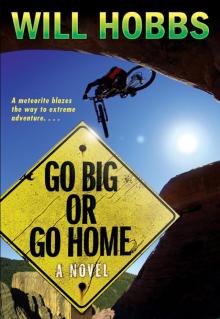 Go Big or Go Home
Go Big or Go Home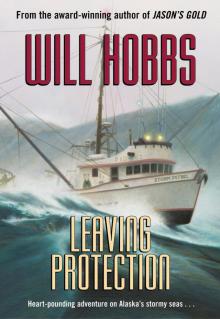 Leaving Protection
Leaving Protection Wild Man Island
Wild Man Island